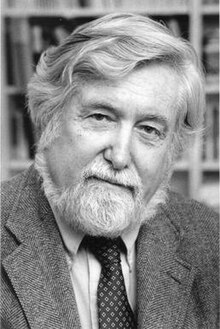Clifford Geertz
| Clifford Geertz | |
|---|---|
 |
|
| Born |
August 23, 1926 San Francisco, California |
| Died | October 30, 2006 (aged 80) Philadelphia, Pennsylvania |
| Nationality | American |
| Fields | Anthropology |
| Institutions | Institute for Advanced Study, Princeton, New Jersey |
| Alma mater |
Antioch College (B.A.) Harvard University (Ph.D.) |
| Doctoral advisor | Talcott Parsons |
| Doctoral students | James Siegel, James Boon, Lawrence Rosen, Abdellah Hammoudi, Sherry Ortner, Paul Rabinow, David Szanton |
| Influences | Talcott Parsons, Gilbert Ryle, Ludwig Wittgenstein, Max Weber, Paul Ricoeur, Alfred Schütz |
| Influenced | Stephen Greenblatt, Quentin Skinner |
Clifford James Geertz (![]() i/ˈɡɜːrts/; August 23, 1926 – October 30, 2006) was an American anthropologist who is remembered mostly for his strong support for and influence on the practice of symbolic anthropology, and who was considered "for three decades...the single most influential cultural anthropologist in the United States." He served until his death as professor emeritus at the Institute for Advanced Study, Princeton.
i/ˈɡɜːrts/; August 23, 1926 – October 30, 2006) was an American anthropologist who is remembered mostly for his strong support for and influence on the practice of symbolic anthropology, and who was considered "for three decades...the single most influential cultural anthropologist in the United States." He served until his death as professor emeritus at the Institute for Advanced Study, Princeton.
Geertz was born in San Francisco on August 23, 1926. After service in the US Navy in World War II (1943–45), Geertz received his B.A. in philosophy from Antioch College in 1950. After graduating from Antioch he attended Harvard University from which he graduated in 1956, as a student in the Department of Social Relations. This interdisciplinary program was led by Talcott Parsons, and Geertz worked with both Parsons and Clyde Kluckhohn. Geertz was trained as an anthropologist, and conducted his first long-term fieldwork, together with his wife, Hildred, in Java, which was funded by the Ford Foundation and MIT. He studied the religious life of a small, upcountry town for 2.5 years, living with a railroad labourer's family. After finishing his thesis, Geertz returned to Bali and Sumatra. He earned his Ph.D. in 1956 with a dissertation entitled Religion in Modjukuto: A Study of Ritual Belief In A Complex Society.
...
Wikipedia
